I recently came across the greatest dog bed in the history of dog beds -- seriously, it felt like it was made of clouds. And after asking the dog owner about it, I was pleasantly surprised to find out that the same company also made regular beds. (Score.)
Needless to say, I'm now the proud owner of the human-version of said dog bed.
You see, when a friend or family member recommends a product, you're more likely to take their endorsement seriously. In fact, according to a Word of Mouth Report by Chatter Matters, one of the most meaningful forms of advertising is recommendations from friends and family: 83% of consumers say these recommendations make them more likely to purchase a product or service.
The story of how I bought my mattress is a great example of social proof, which refers to the theory that people tend to adopt the opinions or actions of people they trust. And to help illustrate how brands are using this persuasive technique in their marketing, we've put together a roundup of social proof in action below.
What Is Social Proof?
Social proof is the idea that consumers will adapt their behavior according to what other people are doing. It makes sense, right? When we see a line of customers waiting to eat at a restaurant or a photo of a celebrity drinking a certain brand of coffee, it lends an air of gravitas and quality to the product, doesn't it?
But there's more to it than that. In fact, according to business coach Bailey Richert, there are as many as a dozen different types of social proof, with some logical overlap among them. Here's how social proof can manifest itself:
1. Expert's Stamp of Approval
Expert social proof is when an industry thought leader or influencer approves of your product. This could take the form of them blogging, posting on social media, or being quoted or photographed as a product user.
2. Celebrity Endorsement
Celebrity social proof typically takes the form of a celebrity using a product and promoting it on social media or in public. This form of social proof is especially meaningful if the endorsement is unpaid.
3. User Testimonials
There's a reason businesses create case studies about the successes their customers have had using their product: It's a vote of confidence in the product's value. All kinds of testimonials can have the same impact. Whether it's a customer review on the business's website, a review on a third-party website, a star-based rating, or a full-blown case study, this content creates positive feedback from actual users.
4. Business Credentials
While user testimonials can add value to a product, business credentials can add trust to the product. Businesses can promote credentials like how many customers it has, what well-known businesses are their customers, or the awards and certifications it has received. Sole proprietorships might even use their education or degree as a credential their customers should care about.
5. Earned Media
If the press has published any positive reporting about your brand, this earned media is a great way to build brand awareness, backlinks to your website, and social proof that your business is worth paying attention to.
6. Social Media Shares
The importance of website traffic from social media can vary greatly from company to company, but one thing no business should undervalue is the influence social media posts about your brand can have on potential customers. Enough positive shares of your content on social networks like Facebook, Twitter, LinkedIn, and Instagram can be all the proof one needs to invest in your product or service.
7. "Wisdom of the Crowds"
“Wisdom of the Crowds” social proof appeals to our sense of Fear of Missing Out (FOMO): When lots of people are using or buying a product, others want to follow suit.
8. "Wisdom of your Friends"
“Wisdom of your Friends” social proof refers to the phenomenon I described previously: The recommendations from people we know and trust carry far more weight than other types of promotions or advertising.
Which Types of Social Proof Work Best?
The (social) proof is in the pudding: Social proof in your marketing and advertising can have a huge impact. But what type of social proof works best?
While this will likely depend on the product or service you are marketing, our friends at Sprout Social curated some helpful research by BrightLocal to help shed some light on the situation.
Below you'll find some noteworthy statistics about the types of social proof that perform best, and what you need to know about convincing your prospective customers:
- 88% of consumers trust user reviews as much as personal recommendations.
- Placing the logos of business customers on a company website can increase conversions by as much as 400%, according to Voices.com.
- Influencer marketing has been considered the fastest-growing consumer-acquisition channel.
- The average consumer reads 10 online reviews before making a purchase decision.
- 57% of consumers will only buy or use a business service if it has at least a 4-star rating.
- For 50% of all consumers, their very next step after reading a positive review about a company is to visit their website.
Now that we've reviewed what social proof is, and the impact it can have, let's dive into some real-world examples of each type ...
Social Proof Examples
Click the categories below to see real-world examples of social proof:
- Expert's Stamp of Approval
- Celebrity Endorsement
- User Testimonials
- "Wisdom of the Crowd"
- "Wisdom of your Friends"
Expert's Stamp of Approval
1. Nature Made

Nature Made uses the expert certification of the USP (U.S. Pharmacopeial Convention) to speak for their vitamins instead of describing their quality themselves. The image of the seal of approval also echoes the text in their Facebook post.
2. Workday
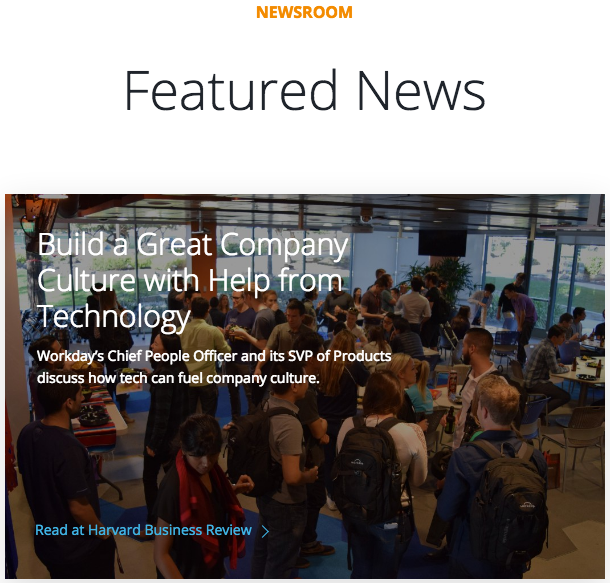
Workday's Newsroom features an article in the Harvard Business Review about their company culture, which is a smart use of social proof: By featuring a well-known university name and publication with expertise in business, they impress site visitors from the moment they try to learn more about the company.
3. Fitbit
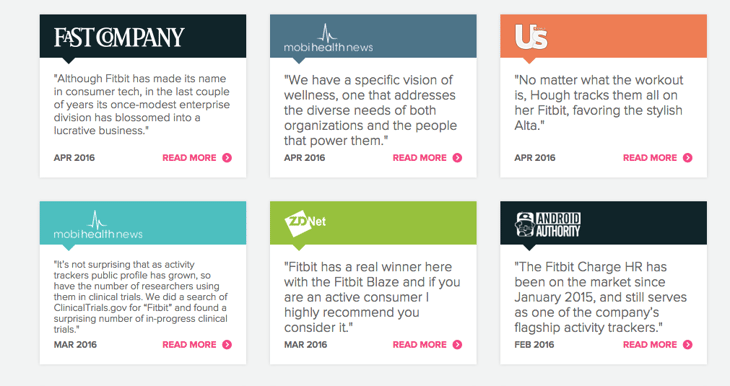
Fitbit lets health and tech industry experts speak to the quality of their products in the “Buzz” section of their website. It adds a lot of weight to claims of Fitbit's success when multiple publications are saying the same positive things they are. That could be why Fitbit is often rated the top fitness tracker on the market.
4. 2U
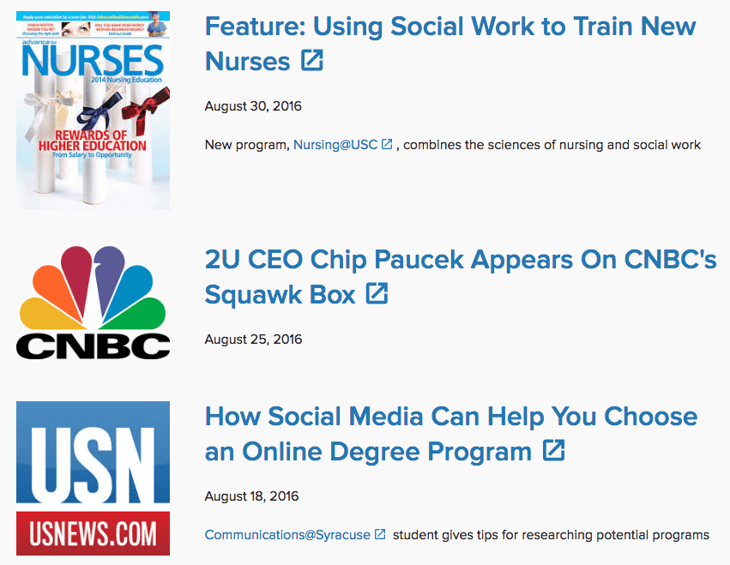
Education SaaS company 2U uses expert social proof to lend gravitas to its homepage. Highlighting press mentions on your website commands authority and lets visitors know that important voices are talking about you in the press. (Check out this handy PR guide for more on the power of press.)
Celebrity Endorsement
5. Jenny Craig
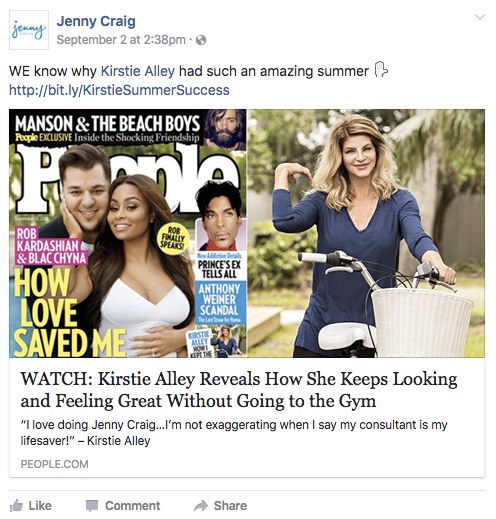
When celeb Kirstie Alley signed on as Jenny Craig's spokeswoman, she lost a well-photographed 50 pounds on the program, helping to skyrocket the brand's popularity in a crowded market: It's one of the top three diet plans in the United States.
6. Cisco
Here's Cisco using celebrity social proof to add wow factor and storytelling to market their IT systems, which aren't typically the most exciting commercial topic. The celebrity adds a human element to a highly technological space in a way that's memorable and inspires recognition. (Who doesn't love Obi-Wan Kenobi?)
7. Tracy Anderson Method
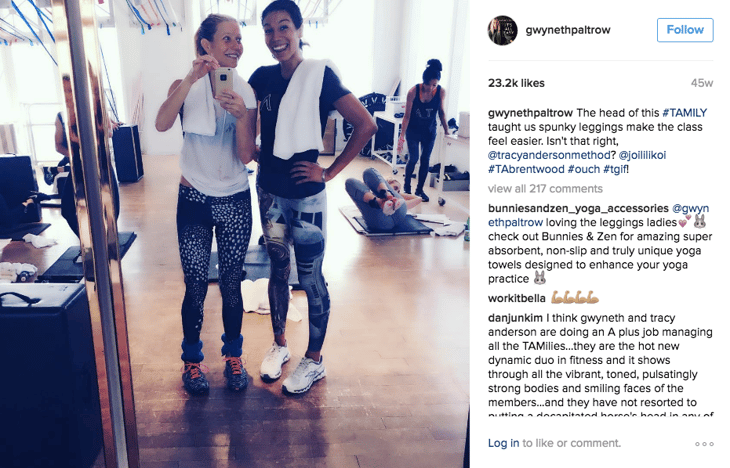
Gwyneth Paltrow is a longtime fan and friend of Tracy Anderson and her exercise program, which she frequently posts about on social media. This isn't an official celebrity endorsement, and its authenticity helps drive more people to Anderson's program: The Tracy Anderson Method is now a multi-studio, DVD, and live streaming fitness empire.
8. Manuka Doctor
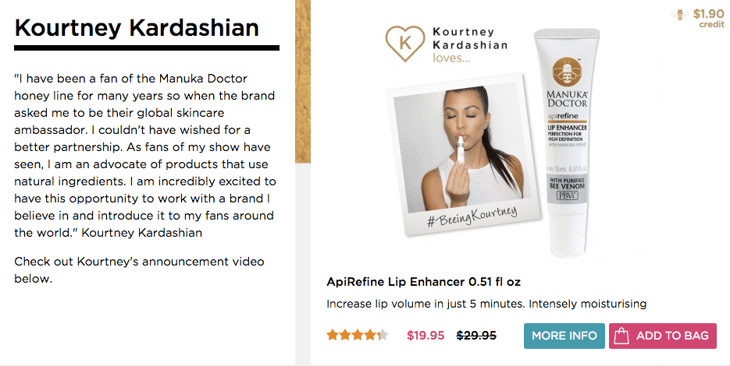
I had never heard of Manuka honey until I watched this episode of Broad City, but it exploded in popularity after Kourtney Kardashian started using it on her reality show, and then became a celebrity ambassador. This is a particularly successful celebrity social proof because Kardashian's longtime use of the product lends more authenticity than a celebrity endorsement alone would.
9. Wix
Website builder Wix uses Heidi Klum for celebrity social proof in their commercial. It works in two ways: to add a high-profile name to a business in a competitive industry, and to demonstrate Wix's pitch (that anyone can build a website).
Wix also used Kung-Fu Panda (fictitious celebrities count, too) in their 2016 Super Bowl commercial, which garnered more online views than any other commercial at the game.
User Testimonials
10. Yelp
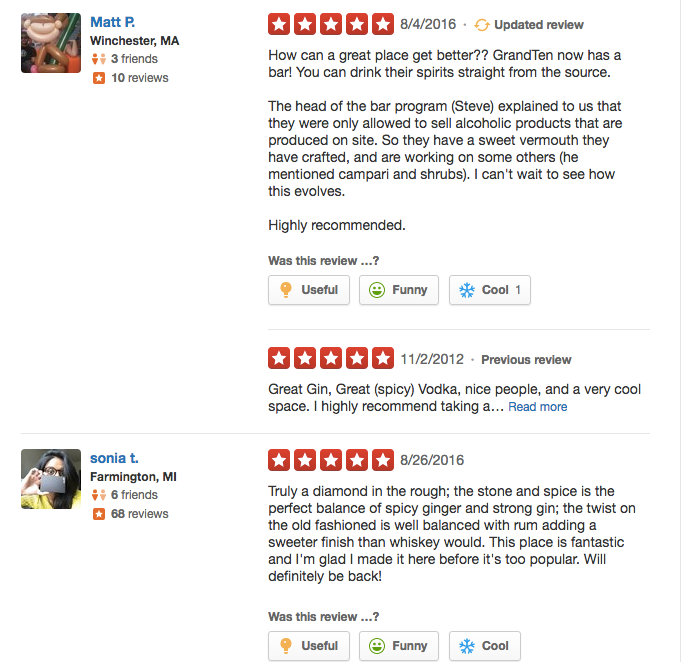
Yelp relies on user reviews to rate restaurants, bars, and business, and the use of social proof is beneficial for their company and for its users searching for customer reviews. Yelp generates roughly 145 million visitors each month and is one of the most popular websites in the United States.
11. IMDb
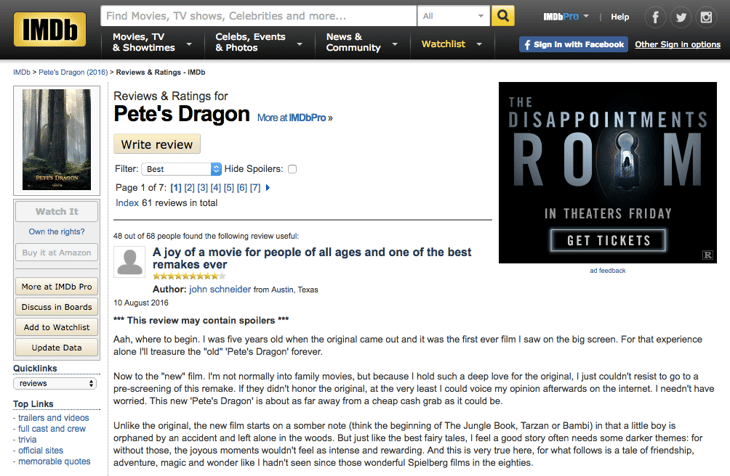
IMDb visitors can consult their review directory to learn what other movie-goers are saying about films they're interested in, and its savvy use of social proof helped make it the top movie review sites online today with 250 million unique visitors per month.
12. Amazon
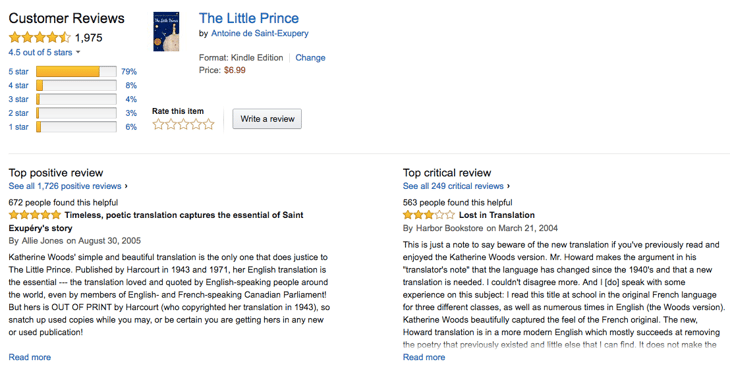
Customer reviews and testimonials are one of the strongest forms of social proof, and Amazon provides another great example of how they can be used. In their review sections, they publish the breakdown of the different ratings so visitors can easily see if the majority of purchasers were happy or unhappy with what they bought.
Customers can also publish reviews with specific comments and photos of their purchases, which are more eye-catching forms of social proof for visitors than testimonials alone.
13. G2 Crowd

G2 Crowd is a business built on user social proof: It offers businesses a database of reviews and recommendations before making a software purchase. The reviews feature verified users of the product, their LinkedIn career information, and the logo of the product being reviewed, which is a research-backed strategy for promoting greater viewer recall and retention.
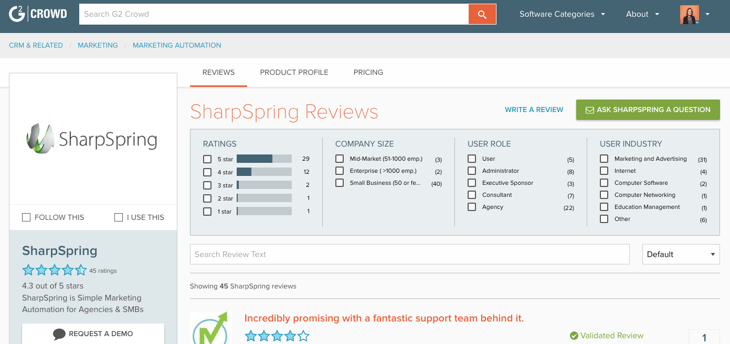
14. BuzzSumo
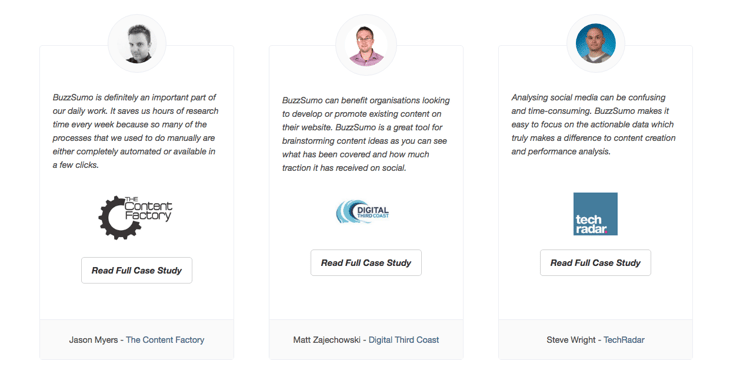
Here's a thorough example of user social proof from BuzzSumo. Their website features customer testimonials and case studies so visitors can read about the full story behind the product they're considering without any question of its impact on real customers and organizations. This transparent user proof is extremely compelling for visitors and potential customers.
"Wisdom of the Crowd"
15. Copyblogger
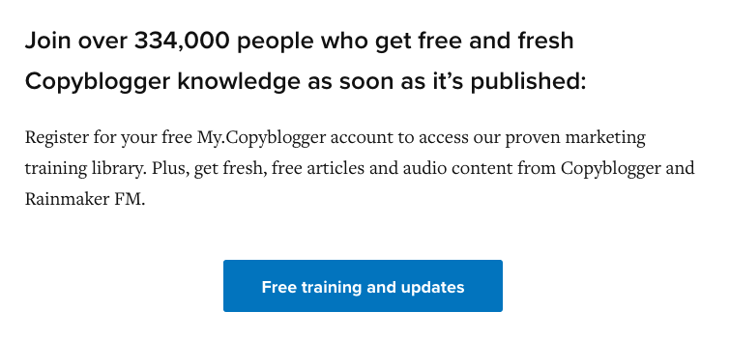
Copyblogger has a fantastic blog, and they use the CTA above to get readers to subscribe by encouraging them to join a larger community of people with shared interests. If 334,000 other people are finding value in the content, it must be good, right?
16. Netflix

Netflix takes advantage of user trends by suggesting new TV and movie options based on popularity. This clever use of social proof helps them keep people binge-watching instead of navigating away when they finish a movie or season -- a great retention strategy, if you ask me.
Much like when things are trending on Twitter, trending suggestions aim to pique the interest of users and persuade them to tune in.
17. TrackMaven
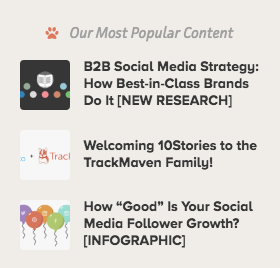
TrackMaven's blog features a "Most Popular Content" sidebar shown above to show blog readers other articles that are generating lots of reader traffic. This feature encourages visitors to go with the crowd and spend more time on the site, where TrackMaven can prompt them with calls-to-action and content offers to generate leads.
"Wisdom of your Friends"
18. Facebook
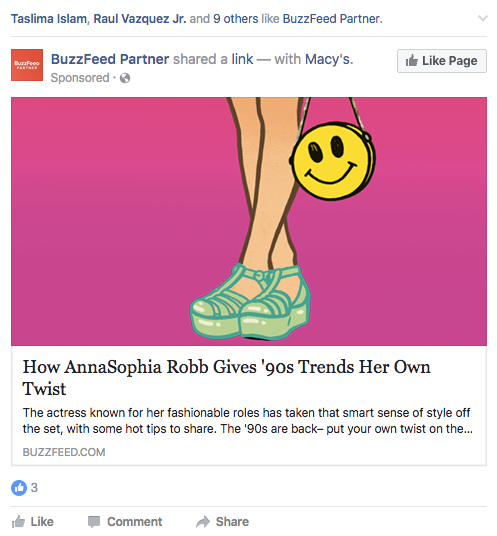
Facebook suggests Pages and articles for users based on how their friends are interacting with the social media platform. This form of social proof is supported by our inherent trust in people we already know:
Remember, we take our friends' recommendations more seriously than any other type of advertising.
19. Ticketfly
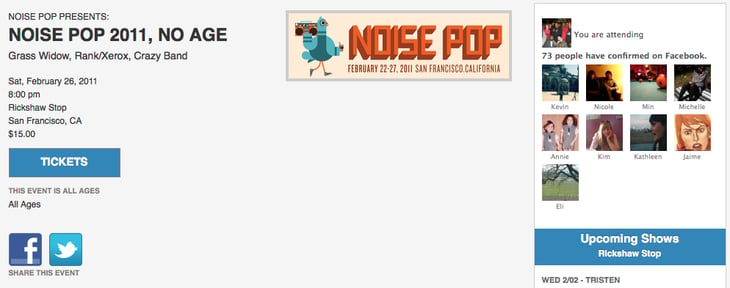
Ticketfly pulls customer Facebook data to show them which of their friends are attending the same events as they are. It also uses social share buttons so users can share what events they're attending to garner more interest among their social media networks.
20. Stitch Fix
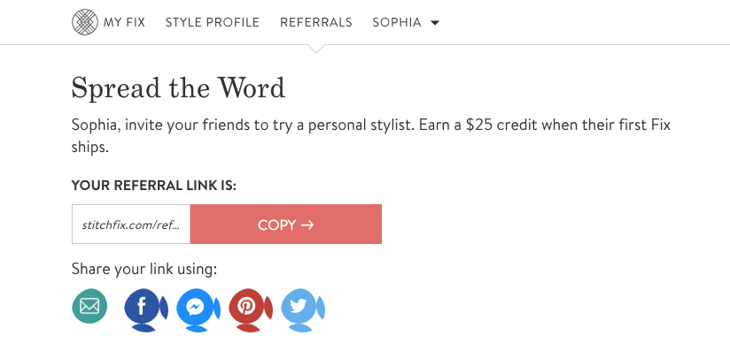
Stitch Fix recruits new customers for its personal shopping service using social proof by offering a hefty $25 referral bonus for sending friends to the site. It's a cost-effective method for retaining me, their current customer, and recruiting my friend, who could become a new one.
Now that you've learned all about social proof, check out our article to learn how to take your social proof to the next level. Happy brainstorming!
What social proof strategies have worked on you? Share with us in the comments below.

No comments:
Post a Comment